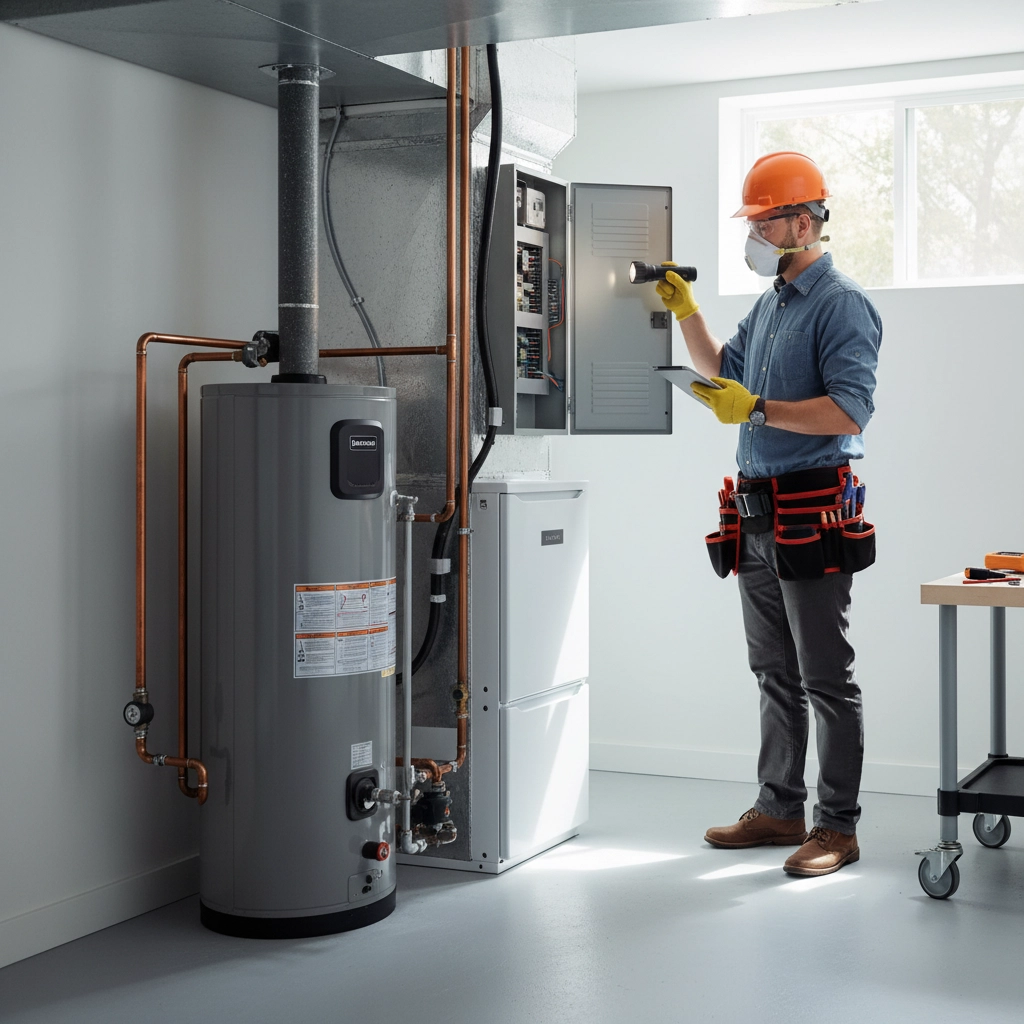Understanding the appraisal and inspection process can make or break your home sale. Learn what to expect, how to prepare, and how to keep your Stateline transaction running smoothly from contract to close.
What Every Stateline Seller Needs to Know About Appraisals & Inspections

When you're selling your home in Northern Illinois or Southern Wisconsin, two critical evaluations stand between your accepted offer and closing day: the appraisal and the home inspection. While both involve professionals examining your property with clipboards and measuring devices, they serve completely different purposes and can impact your sale in very different ways.
After helping hundreds of Stateline families navigate these processes, I've seen too many sellers caught off guard simply because they didn't understand what to expect. Let's demystify both processes so you can prepare your home: and yourself: for success.
The Tale of Two Evaluations: Appraisal vs. Inspection
Think of it this way: the appraiser works for the bank and asks "Is this house worth what we're lending on it?" The inspector works for the buyer and asks "What problems might this buyer face after moving in?"
The appraiser spends 30-60 minutes taking photos, measuring rooms, and making notes about your home's condition and features. They're not testing your garbage disposal or climbing into your crawl space: they're comparing your property to similar homes that have sold recently in your area to determine fair market value.
The inspector, on the other hand, might spend 3-4 hours methodically testing every system in your home. They'll flip every light switch, run every faucet, test your furnace, and check your electrical panel. If there's a way to turn it on, plug it in, or flush it, they're going to test it.
The Appraisal Process: Protecting the Lender's Investment
In our Stateline market, appraisals typically happen 1-2 weeks after your buyer's offer is accepted. The buyer's mortgage company orders the appraisal from a licensed appraiser who's familiar with your local area: whether that's Rockford, Beloit, DeKalb, or the smaller communities scattered across our region.

What Appraisers Look For in Stateline Homes
Appraisers evaluate several key factors that directly affect your home's value in our market:
Square footage accuracy: They'll measure your home and compare it to public records. In older Stateline communities, it's not uncommon for records to be outdated or inaccurate, especially if previous owners finished basements or added rooms.
Comparable sales: This is where local knowledge matters. An appraiser familiar with your specific neighborhood understands that a home near Northern Illinois University in DeKalb might be valued differently than a similar home in a family-oriented subdivision, even if they're the same size.
Condition and quality: They note everything from your kitchen's granite countertops to that original 1970s bathroom that needs updating. They're not necessarily penalizing you for the avocado green fixtures, but they're noting how your home's condition compares to others in the area.
Permits and additions: This is particularly important in our region, where many homes have finished basements or additions. If you converted your garage into a family room or finished your basement without permits, this could impact the appraisal. Different municipalities across Northern Illinois and Southern Wisconsin have varying enforcement levels, but appraisers must note unpermitted work.
When Appraisals Come in Low
In our current Stateline market, low appraisals happen in about 10-15% of transactions. When this occurs, you have several options:
You can negotiate a lower sale price with the buyer, which obviously isn't ideal but might be necessary if comparable sales support the appraiser's value. Alternatively, if the buyer has extra cash and really wants your home, they might pay the difference between the appraised value and your agreed-upon price out of pocket.
You can also challenge the appraisal by providing additional comparable sales the appraiser might have missed. In our spread-out Stateline region, appraisers sometimes overlook sales in nearby communities that might actually be more comparable than closer properties.
The Home Inspection: A Buyer's Detective Work
Home inspections typically happen within 7-10 days of your accepted offer, and unlike appraisals, you'll likely be present for at least part of this process. Inspections in our area usually take 2-4 hours, depending on your home's size and age.
What Inspectors Examine
Inspectors evaluate your home's major systems and structural elements:
Electrical systems: In older Stateline homes, this often reveals outdated wiring or electrical panels that need updating. Homes built in the 1960s-80s might have electrical systems that, while functional, don't meet current safety standards.
Plumbing: They'll test water pressure, look for leaks, and examine your water heater. In our region's older homes, they're often looking for original cast iron or galvanized pipes that might need replacement.
HVAC systems: Your furnace, air conditioning, and ductwork get thoroughly examined. Given our harsh winters and humid summers, HVAC systems work hard in the Stateline area, and inspectors know what to look for.
Structural elements: Foundation issues, roof problems, and structural concerns are all fair game. In our area, they're particularly attentive to foundation settling and ice dam damage on roofs.
Safety concerns: Smoke detectors, carbon monoxide detectors, GFCI outlets, and handrail safety all get checked.

Preparing Your Home for Success
Before the Appraisal
Make sure your home is clean and well-maintained. While appraisers focus on value rather than cleanliness, a well-kept home suggests good maintenance to the appraiser.
Gather documentation for any improvements you've made, especially if you have permits. If you upgraded your kitchen, finished your basement, or added a deck, having permits and receipts can help justify your home's value.
Create a list of recent improvements and their costs. While appraisers can't simply add your improvement costs to your home's value, they help paint a picture of a well-maintained property.
Before the Inspection
Address obvious problems before the inspector arrives. Fix dripping faucets, replace burned-out light bulbs, and ensure all systems are operational. Small issues that are easy to fix can look like bigger problems during an inspection if left unaddressed.
Make sure the inspector can access everything. Clear stored items away from your electrical panel, furnace, and water heater. Unlock any areas they'll need to examine, including attics, crawl spaces, and utility rooms.
Consider having your own pre-inspection done. Many Stateline sellers find it worthwhile to hire their own inspector before listing. This allows you to address problems on your timeline rather than scrambling to fix things during the negotiation period.
Local Considerations for Stateline Sellers
Our region has some unique characteristics that both appraisers and inspectors understand:
Seasonal challenges: Winter inspections might not reveal roof or foundation issues that become apparent in spring. Summer inspections in older homes without air conditioning might not fully test heating systems.
Agricultural proximity: Homes near farm fields might face unique considerations, from well water quality to seasonal odors that could affect value or desirability.
Varying municipal standards: Building codes and enforcement vary significantly between communities in our region. What's acceptable in a rural Wisconsin township might not fly in Rockford or DeKalb.
Working With Your Agent Through These Processes
This is where having a knowledgeable local agent becomes invaluable. At Lisa Ellis Home Team, we've been through thousands of appraisals and inspections across Northern Illinois and Southern Wisconsin. We know which appraisers understand our local markets best and which inspectors are thorough but fair.
We also help you interpret results and negotiate solutions. When an inspection reveals that your 20-year-old furnace has a cracked heat exchanger, we can help you understand whether this is a deal-killer or something that can be negotiated.

When Problems Arise
Not every appraisal comes in at your sale price, and not every inspection comes back clean. Here's how to handle common issues:
Low appraisals: We'll review the appraiser's comparable sales and potentially challenge the valuation if we believe it's inaccurate. Sometimes we can provide additional comparables or point out features the appraiser might have overlooked.
Inspection issues: Most inspection reports contain multiple items: some significant, others minor. We help you determine which issues you should address, which you should offer credits for, and which might be unreasonable requests from the buyer.
Multiple problems: When both the appraisal and inspection create challenges, we develop a strategy that keeps your sale on track while protecting your interests.
The Bottom Line for Stateline Sellers
Understanding appraisals and inspections removes much of the anxiety from the selling process. Both evaluations serve important purposes, and both can occasionally create bumps in the road to closing.
The key is preparation: maintain your home well, price it appropriately based on local market conditions, and work with an agent who understands both processes and our local market dynamics.
Most appraisals and inspections in our Stateline market proceed smoothly, especially when sellers understand what to expect and prepare accordingly. When issues do arise, they're usually manageable with the right approach and experienced guidance.
If you're considering selling your Northern Illinois or Southern Wisconsin home and want to discuss how to prepare for these evaluations, contact us for a consultation. We'll help you understand what appraisers and inspectors will see when they visit your home, and how to position your property for success.
Remember: knowledge is power in real estate. Understanding these processes helps you make better decisions and reduces stress throughout your selling journey.
Real Estate with Heart — Serving Northern Illinois & Southern Wisconsin
At Lisa Ellis Home Team, real estate is more than transactions—it’s about people, stories, and smooth transitions. Whether you're buying your dream home or selling a loved one’s estate, we tailor every plan to you. With smart marketing, fast communication, and local expertise, we deliver results that move you—literally.
Let’s make your next move the best one yet.





